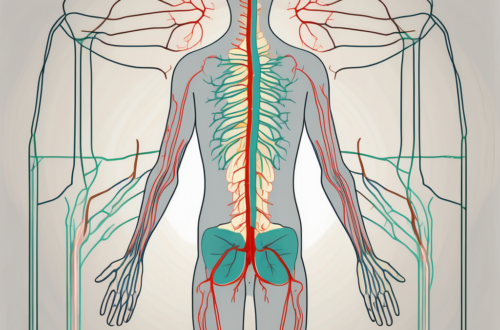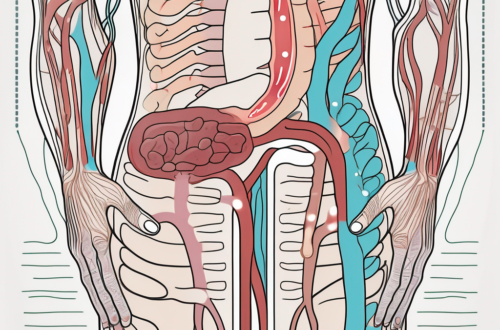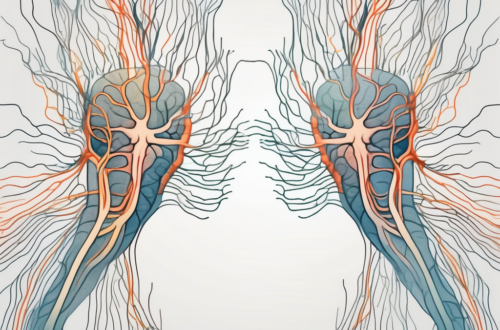In today’s fast-paced and stress-filled world, finding ways to relax and restore balance to our bodies is more important than ever. One crucial aspect of our body’s stress response system is the parasympathetic nervous system, responsible for promoting rest, relaxation, and digestion. By understanding and nurturing our parasympathetic nerve, we can enhance our overall well-being and cope better with daily challenges. In this article, we will explore the role of the parasympathetic nerve, its connection to stress, and techniques to strengthen it. However, it’s important to note that while these techniques can be beneficial, it is always wise to consult with a healthcare professional before making any significant changes to your health routine.
Understanding the Parasympathetic Nervous System
The parasympathetic nervous system is one of the two main divisions of the autonomic nervous system, which controls involuntary bodily functions. It operates in opposition to the sympathetic nervous system, which is responsible for the “fight or flight” response. When our body perceives danger or stress, the sympathetic nervous system activates, preparing us for action. On the other hand, the parasympathetic nervous system is activated when we feel safe, promoting relaxation and equilibrium.
The parasympathetic nervous system plays a crucial role in maintaining the body’s internal balance, also known as homeostasis. It works in harmony with the sympathetic nervous system to ensure that our bodily functions are regulated appropriately in response to different situations.
When the parasympathetic nervous system is activated, it has a calming effect on the body. It helps to slow down our heart rate, decrease blood pressure, and increase digestive activity. This allows our body to conserve energy and focus on processes such as digestion, absorption of nutrients, and elimination of waste.
The Role of the Parasympathetic Nerve in the Body
The parasympathetic nerve, also known as the “rest and digest” nerve, works to slow down our heart rate, decrease blood pressure, and increase digestive activity. It helps maintain the body in a state of rest and rejuvenation, allowing us to recover from physical and mental exertion.
When the parasympathetic nervous system is activated, it sends signals to various organs and tissues in the body, including the heart, lungs, stomach, and intestines. These signals prompt the release of neurotransmitters, such as acetylcholine, which help regulate the functions of these organs.
For example, the parasympathetic nervous system stimulates the release of saliva, which aids in the digestion of food. It also stimulates the production of digestive enzymes and increases blood flow to the digestive organs, ensuring optimal nutrient absorption.
In addition to its role in digestion, the parasympathetic nervous system also promotes relaxation and restorative processes in the body. It helps to reduce muscle tension, lower blood pressure, and slow down breathing rate. This allows the body to conserve energy and focus on repairing and rejuvenating tissues.
The Connection Between the Parasympathetic Nerve and Stress
Chronic stress can disrupt the balance between the sympathetic and parasympathetic nervous systems, leading to a weakened parasympathetic response. This imbalance can manifest as symptoms like anxiety, sleep disturbances, digestive issues, and even cardiovascular problems. Taking steps to strengthen the parasympathetic nerve can improve our ability to manage stress and promote overall well-being.
There are various techniques and practices that can help activate and strengthen the parasympathetic nervous system. These include deep breathing exercises, meditation, yoga, progressive muscle relaxation, and spending time in nature. Engaging in activities that promote relaxation and self-care can also have a positive impact on the parasympathetic nervous system.
By prioritizing activities that activate the parasympathetic nervous system, we can enhance our body’s ability to rest, digest, and recover. This, in turn, can improve our overall health and well-being, allowing us to better cope with stress and maintain a balanced and harmonious state of being.
The Importance of a Strong Parasympathetic Nerve
A well-functioning parasympathetic nerve offers numerous health benefits and plays a vital role in maintaining our overall wellness. The parasympathetic nervous system is responsible for the rest and digest response in our bodies, which is crucial for our physical and mental well-being. It works in harmony with the sympathetic nervous system, which is responsible for the fight or flight response.
Here are some advantages of having a balanced nervous system:
Health Benefits of a Balanced Nervous System
A balanced nervous system helps us feel more relaxed, improves our digestion, enhances sleep quality, boosts immune function, and promotes better mental clarity. When our parasympathetic nerve is functioning optimally, it stimulates the release of acetylcholine, a neurotransmitter that helps slow down our heart rate, lower blood pressure, and increase blood flow to our digestive organs.
Improved digestion is one of the significant benefits of a balanced nervous system. When the parasympathetic nerve is activated, it increases the production of digestive enzymes and enhances the absorption of nutrients from the food we consume. This can lead to better nutrient availability, improved gut health, and overall improved digestion.
Enhanced sleep quality is another advantage of a balanced nervous system. When our parasympathetic nerve is activated, it helps us unwind and relax, making it easier for us to fall asleep and stay asleep throughout the night. Adequate sleep is essential for our physical and mental restoration, and a strong parasympathetic nerve contributes to achieving that.
Boosted immune function is also linked to a balanced nervous system. Chronic stress, which is associated with an overactive sympathetic nervous system, can weaken our immune system and make us more susceptible to infections and illnesses. By maintaining a healthy balance between the sympathetic and parasympathetic nervous systems, we can support our immune system and improve our body’s defense mechanisms.
Promoting better mental clarity is yet another advantage of a balanced nervous system. When our parasympathetic nerve is functioning optimally, it helps calm our mind and reduce anxiety and stress. This allows us to think more clearly, make better decisions, and improve our overall cognitive function.
It can also contribute to a calmer and more positive outlook on life. When we are in a state of relaxation and balance, we are more likely to experience feelings of contentment, happiness, and overall well-being. A strong parasympathetic nerve helps us achieve this state, allowing us to navigate life’s challenges with a greater sense of calmness and resilience.
By supporting our parasympathetic nerve, we can cultivate these benefits and enhance our overall quality of life.
Potential Risks of a Weak Parasympathetic Nerve
On the other hand, a weakened parasympathetic nerve can leave us feeling constantly on edge, disrupt our digestion, impair sleep, weaken the immune system, and even increase the risk of various health conditions. When our parasympathetic nerve is not functioning optimally, it can lead to an imbalance in our autonomic nervous system, with the sympathetic nervous system dominating.
Recognizing the signs of a weak parasympathetic nerve can help us take appropriate measures to strengthen it. Some common signs include chronic stress, difficulty relaxing, digestive issues such as bloating and constipation, poor sleep quality, frequent infections, and a general feeling of being constantly on high alert.
Fortunately, there are several ways to support and strengthen our parasympathetic nerve. Engaging in relaxation techniques such as deep breathing exercises, meditation, and yoga can help activate the parasympathetic nervous system and promote a state of calmness and relaxation. Regular exercise, a healthy diet, and sufficient sleep also play a crucial role in maintaining a balanced nervous system.
In conclusion, a strong parasympathetic nerve is essential for our overall well-being. By understanding its importance and taking steps to support and strengthen it, we can experience the numerous health benefits associated with a balanced nervous system.
Techniques to Strengthen Your Parasympathetic Nerve
Fortunately, there are various techniques we can incorporate into our daily lives to support and strengthen our parasympathetic nerve. Remember, however, that these techniques should complement professional guidance and not replace it. Let’s explore a few of them:
Breathing Exercises for Nervous System Health
Deep breathing exercises can activate the parasympathetic nervous system and induce a state of relaxation. Techniques such as diaphragmatic breathing, alternate nostril breathing, and progressive muscle relaxation can help calm your mind and promote a sense of tranquility.
Diaphragmatic breathing, also known as belly breathing, involves taking slow, deep breaths, filling your lungs and expanding your diaphragm. This technique helps increase oxygen flow throughout your body, promoting a sense of calm and reducing anxiety.
Alternate nostril breathing is a technique that involves breathing in through one nostril and exhaling through the other. This practice helps balance the left and right sides of the brain, promoting a sense of harmony and relaxation.
Progressive muscle relaxation involves tensing and then releasing different muscle groups in your body, one at a time. This technique helps relieve muscle tension and promotes a deep sense of relaxation.
Dietary Changes to Boost Parasympathetic Activity
Choosing a diet rich in whole foods, fruits, and vegetables can provide essential nutrients that support the parasympathetic nerve’s optimal function. Incorporating foods known for their calming properties, such as chamomile tea or foods high in omega-3 fatty acids like salmon, can also contribute to overall nervous system health.
Chamomile tea has been used for centuries as a natural remedy for promoting relaxation and reducing anxiety. Its soothing properties can help calm the mind and support the parasympathetic nervous system.
Omega-3 fatty acids, found in fatty fish like salmon, have been shown to have anti-inflammatory effects on the body. These healthy fats can help reduce stress and promote a healthy nervous system.
In addition to these specific foods, it’s important to maintain a balanced diet that includes a variety of nutrients. This can help ensure that your parasympathetic nerve receives the necessary support for optimal functioning.
Physical Activities that Enhance Parasympathetic Function
Engaging in gentle forms of exercise such as yoga, tai chi, or walking can stimulate the parasympathetic nerve and promote relaxation. These activities not only provide physical benefits but also help calm the mind and reduce stress levels.
Yoga combines physical postures, breathing exercises, and meditation to promote overall well-being. The slow and controlled movements in yoga help activate the parasympathetic nervous system, inducing a state of relaxation and reducing stress.
Tai chi, an ancient Chinese martial art, focuses on slow, flowing movements and deep breathing. This practice helps improve balance, flexibility, and mental clarity, while also stimulating the parasympathetic nerve.
Walking, a simple yet effective form of exercise, can also enhance parasympathetic function. Taking a leisurely stroll in nature or around your neighborhood can help clear your mind, reduce stress, and promote relaxation.
Remember, incorporating these techniques into your daily routine can have a positive impact on your parasympathetic nerve and overall well-being. However, it’s important to consult with a healthcare professional for personalized guidance and support.
Monitoring Your Progress
When it comes to strengthening your parasympathetic nerve, it’s important to not only incorporate techniques but also monitor your progress. By doing so, you can recognize the signs of improvement and make any necessary adjustments along the way.
Signs of a Strong Parasympathetic Nerve
One of the indicators of a well-functioning parasympathetic nerve is a reduced heart rate. As you continue to practice techniques that stimulate this branch of your autonomic nervous system, you may notice that your heart rate becomes more stable and calm.
In addition to a reduced heart rate, an improved digestion is another sign of a strong parasympathetic nerve. This branch of your autonomic nervous system is responsible for promoting rest and digestion, so when it’s functioning optimally, you may experience smoother digestion and less gastrointestinal discomfort.
Better sleep quality is also associated with a well-functioning parasympathetic nerve. As you continue to strengthen this branch of your nervous system, you may find that you fall asleep more easily, stay asleep throughout the night, and wake up feeling refreshed and rejuvenated.
Increased focus is another positive outcome of a strong parasympathetic nerve. When your body and mind are in a state of calmness, it becomes easier to concentrate and stay present in the moment. This can enhance your productivity and overall cognitive performance.
Lastly, a general sense of calmness is a key sign that your parasympathetic nerve is functioning well. You may notice that you feel more relaxed, less stressed, and better equipped to handle everyday challenges with ease.
How to Know if Your Techniques are Working
While understanding the signs of a strong parasympathetic nerve is important, it’s equally crucial to assess the effectiveness of the techniques you’re implementing. One way to do this is by observing how you feel both physically and mentally.
Keeping a journal can be a helpful tool in tracking your symptoms and progress. By recording your experiences, emotions, and any changes you notice, you can gain valuable insights into the impact of your efforts. This can also serve as a reference point for future adjustments or discussions with healthcare professionals.
Seeking feedback from a healthcare professional is another way to gauge the effectiveness of your chosen techniques. They can provide expert guidance, evaluate your progress, and offer personalized recommendations based on your specific needs and goals.
Remember, monitoring your progress is an ongoing process. As you continue to strengthen your parasympathetic nerve, stay attuned to your body and mind, and make adjustments as needed. With time and consistency, you can optimize the functioning of this vital branch of your autonomic nervous system and reap the benefits of improved overall well-being.
Maintaining a Healthy Parasympathetic Nerve
Building a resilient parasympathetic nerve goes beyond quick fixes – it requires long-term commitment and comprehensive lifestyle choices. Prioritizing self-care, managing stress levels, getting enough sleep, and practicing mindfulness or meditation regularly can contribute to maintaining a healthy parasympathetic nervous system.
Self-care is an essential aspect of nurturing a healthy parasympathetic nerve. This involves taking time for yourself to engage in activities that promote relaxation and well-being. Whether it’s taking a warm bath, reading a book, or going for a leisurely walk in nature, self-care allows you to recharge and replenish your nervous system.
Managing stress levels is crucial for maintaining the health of your parasympathetic nerve. Chronic stress can have detrimental effects on the nervous system, leading to imbalances and dysregulation. Finding healthy ways to cope with stress, such as engaging in regular exercise, practicing deep breathing techniques, or seeking support from loved ones, can help keep your parasympathetic nerve in optimal condition.
Sleep is another vital factor in maintaining a healthy parasympathetic nervous system. During sleep, the body undergoes essential processes of repair and restoration, including the rejuvenation of the nervous system. Getting enough quality sleep allows your parasympathetic nerve to recover from daily stressors and function optimally.
Practicing mindfulness or meditation regularly can also contribute to the health of your parasympathetic nerve. These practices help activate the relaxation response in the body, which stimulates the parasympathetic nervous system. By incorporating mindfulness or meditation into your daily routine, you can enhance the resilience and functioning of your parasympathetic nerve.
Avoiding Factors that Weaken the Parasympathetic Nerve
In addition to actively strengthening your parasympathetic nerve, it’s essential to avoid factors that can hinder its function. Excessive caffeine consumption, prolonged exposure to stress, lack of sleep, and poor dietary choices can all have negative effects on the parasympathetic nervous system.
Excessive caffeine consumption can overstimulate the sympathetic nervous system, which is responsible for the body’s fight-or-flight response. This can lead to an imbalance between the sympathetic and parasympathetic systems, weakening the parasympathetic nerve. It is important to moderate your caffeine intake and be mindful of its effects on your overall nervous system health.
Prolonged exposure to stress can have a profound impact on the parasympathetic nervous system. Chronic stress can lead to dysregulation and exhaustion of the nerve, making it less effective in promoting relaxation and restorative processes. Finding healthy ways to manage and reduce stress is crucial for maintaining the health of your parasympathetic nerve.
Lack of sleep can also weaken the parasympathetic nerve. When the body does not get enough restorative sleep, it can lead to imbalances in the nervous system and hinder the functioning of the parasympathetic system. Prioritizing sleep hygiene and creating a conducive sleep environment can help support the health of your parasympathetic nerve.
Poor dietary choices can negatively impact the parasympathetic nervous system. Consuming a diet high in processed foods, sugars, and unhealthy fats can contribute to inflammation and oxidative stress, which can impair the functioning of the nerve. Opting for a balanced diet rich in whole foods, fruits, vegetables, and lean proteins can support the health of your parasympathetic nerve.
By making conscious choices to minimize these factors, you can nurture the health of your parasympathetic nerve and overall well-being. It is important to prioritize self-care, manage stress levels, get enough sleep, and make healthy dietary choices to maintain a resilient and healthy parasympathetic nervous system.
Conclusion
Strengthening your parasympathetic nerve is an integral part of managing stress and promoting overall well-being. By understanding its role, recognizing the signs of imbalance, and implementing techniques that can enhance its function, you can cultivate a calmer and more resilient nervous system. Nevertheless, it’s vital to remember that everyone’s health journey is unique. Before making any significant changes or embarking on a new health regimen, it’s always wise to consult with a qualified healthcare professional who can provide personalized guidance and support.





